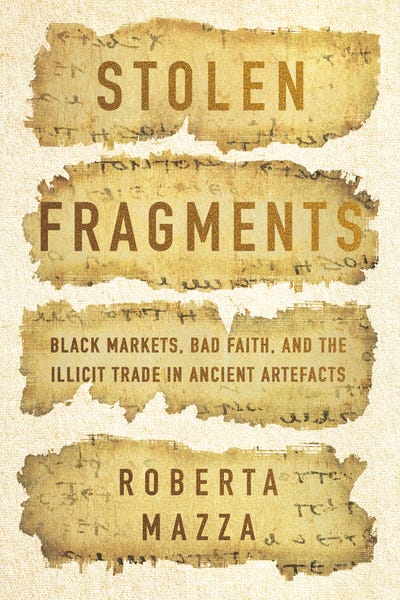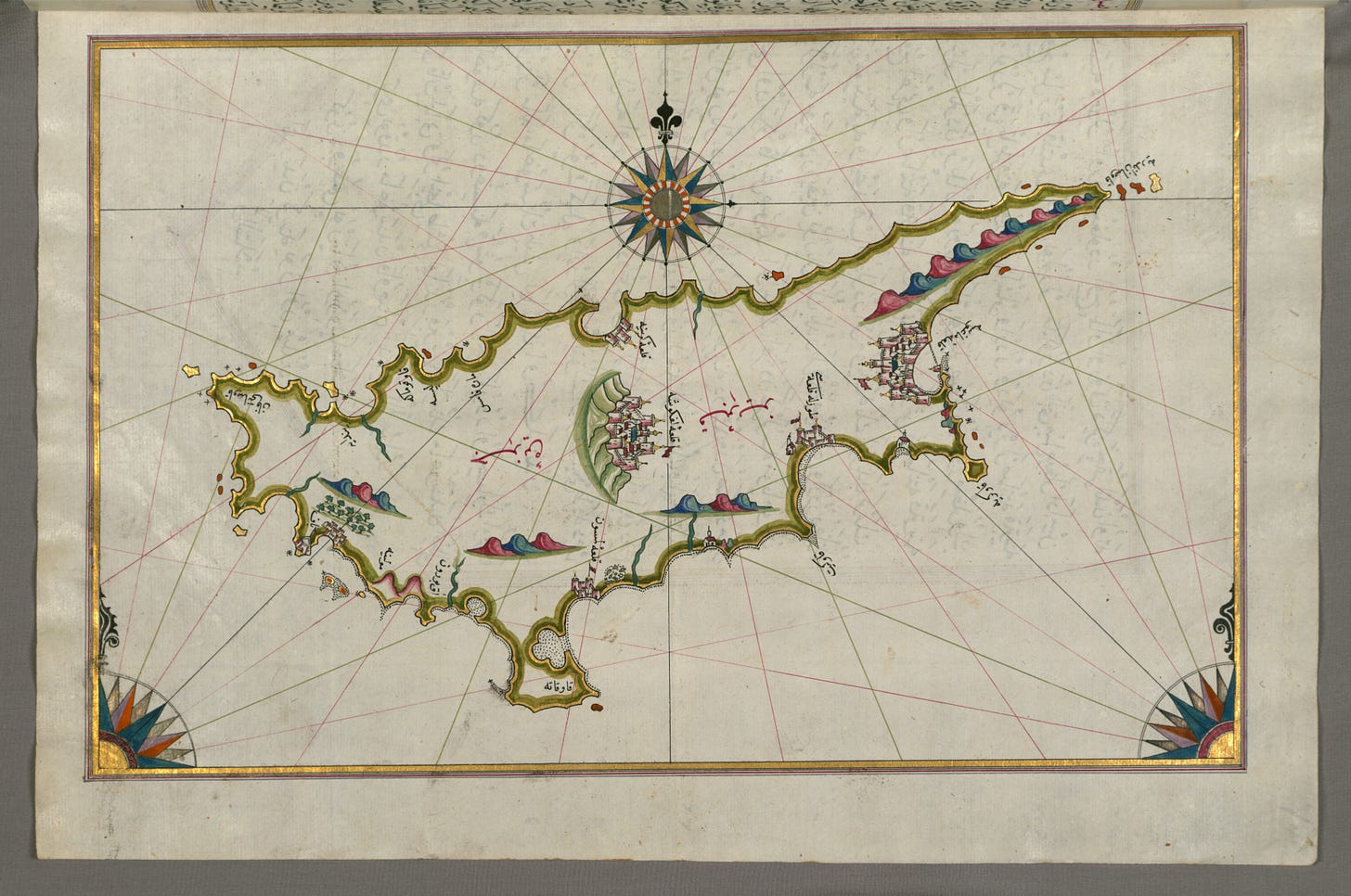Pasts Imperfect (9.12.24)
Illicit Papyri, Looted Antiquities from Sudan, Silk Road Pigments, Kaos, & More

This week, we feature ancient historian and papyrologist Roberta Mazza’s new book, Stolen Fragments: Black Markets, Bad Faith, and the Illicit Trade in Ancient Artefacts. Then, antiquities are looted from the National Museum of Sudan in Khartoum, a new analysis of medieval Silk Road pigments, Kaos has us wondering about the Underworld and Zeus’ tracksuits, newly translated cuneiform omens, new ancient world journals, the upcoming Pasts Imperfect panel at the Stanley Museum of Art in Iowa, and much more.
Stolen Fragments: Black Markets, Bad Faith, and the Illicit Trade in Ancient Artefacts by Roberta Mazza
You can read the entire prologue here:
“In 2012, Steve Green, billionaire and president of the Hobby Lobby chain of craft stores, announced a recent purchase of a Biblical artefact—a fragment of papyrus, just discovered, carrying lines from Paul's letter to the Romans, and dated to the second century CE. Noted scholar Roberta Mazza was stunned. When was this piece discovered, and how could Green acquire such a rare item? The answers, which Mazza spent the next ten years uncovering, came as a shock: the fragment had come from a famous collection held at Oxford University, and its rightful owners had no idea it had been sold.
The letter to the Romans was not the only extraordinary piece in the Green collection. They soon announced newly recovered fragments from the Gospels and writings of Sappho. Mazza's quest to confirm the provenance of these priceless fragments revealed shadowy global networks that make big business of ancient manuscripts, from the Greens' Museum of the Bible and world-famous auction houses like Sotheby's and Christie's, to antique shops in Jerusalem and Istanbul, dealers on eBay, and into the collections of renowned museums and universities.
Mazza's investigation forces us to ask what happens when the supposed custodians of our ancient heritage act in ways that threaten to destroy it. Stolen Fragments illuminates how these recent dealings are not isolated events, but the inevitable result of longstanding colonial practices and the outcome of generations of scholars who have profited from extracting the cultural heritage of places they claim they wish to preserve. Where is the boundary between protection and exploitation, between scholarship and larceny?”
Roberta Mazza’s new book, Stolen Fragments, will be published on September 24, 2024 and can be preordered here. The video above addresses another one of the events discussed in the prologue: Scott Carroll’s destruction of a cartonnage mummy mask from the Green collection.

Public Humanities and a Global Antiquity
In the Guardian, there is a heartbreaking report on the “Tens of thousands of artefacts looted from [the] Sudan museum” by the RSF militia.
The official at the National Museum [of Sudan] in Khartoum said satellite images taken last year showed trucks loaded with artefacts leaving the museum and heading for Sudan’s borders, including the border with South Sudan…“When we learned about the looting, we didn’t sleep for three or four days,” the National Museum official said. “These artefacts are our identity, the identity of the Sudanese people. Can you imagine what it feels like to lose your identity? You lose your existence in this world.”
On X, there are widespread reports that these artifacts are being resold on Ebay.

In a statement from Egypt’s Ministry of Tourism and Antiquities and a subsequent article in LiveScience, Egyptologists revealed they have identified “the first ancient Egyptian astronomical observatory on record, which they say is the ‘first and largest” of its kind.” It dates to the 6thC BCE and was found 3 years ago during the excavation of the ancient city of Bouto (Tell Al-Faraeen).
We at PI are a little obsessed with Netflix’s retelling of Greek myth in the show Kaos at the moment. And Ancient Greek historian Ellie Mackin Roberts has a great review of the show in The Conversation. Come for the Orpheus and Eurydice remix, but stay for Jeff Goldblum as Zeus, Janet McTeer as Hera, Rakie Ayola as Persephone, and of course: Nabhaan Rizwan as Dionysus (along with his pet kitten). Season 2 already seems to be a go, so catch up now.
Emily Wilson, Professor of Classical Studies at the University of Pennsylvania and translator of the Iliad and the Odyssey, has started a Substack. Her first newsletter compares and discusses four translations of the opening of the Odyssey, including her own. In Neos Kosmos, Joel Christensen responded to Bret Stephens’ recent op-ed in the New York Times. Christensen argues that the Socrates of Plato’s Apology was actually quite the political figure. Finally, in the digital pages of Time, classicist Sarah Nooter looks at what the Right gets wrong about ancient sexuality.
In book news, Josephine Quinn’s How the World Made the West is out now in the United States from Penguin Random House. Listen to her discuss her work on the Converging Dialogues Podcast, while at LitHub she explains “How Arabic Translations of Ancient Greek Texts Started a New Scientific Revolution.” Also of note? The Routledge Handbook of Classics, Colonialism, and Postcolonial Theory is now out. Edited By Katherine Blouin and Ben Akrigg, this edited volume has chapters by D. Padilla Peralta, Phiroze Vasunia, Dimitri Nakassis, Mathura Umachandran, Shelley P. Haley, and dozens of other splendid scholars. And at the Jewish Book Council, Julia Watts Belser and Joy Ladin discuss “Disability and Trans Torah.”
In the Journal of Archaeological Science, Sihan Zhao, Zhang He, and a number of co-authors look at an inorganic pigment called Vanadinite. In their article, “Revealing ancient yellow colorants in painted artworks along the silk Road (6th-10th century AD),” they examine pigments in the Kizil Grottoes, the Taojia Tomb, the Baiyangzhai Tomb, and polychrome figurines from the Astana Tombs.

At the Indian Pueblo Cultural Center, they have an important post:“What Does ‘Anasazi’ Mean, and Why Is It Controversial?” As IPCC explains, “Anasazi” is a term that only came about in 1927 via the Pecos Classification system. It was used to reference the Ancestral Pueblo people, but “the term is Navajo in origin, and means ‘ancient enemy.’ The Pueblo peoples of New Mexico understandably do not wish to refer to their ancestors in such a disrespectful manner, so the appropriate term to use is ‘Ancestral Pueblo’ or ‘Ancestral Puebloan.’”
In the new issue of the Journal of Cuneiform Studies, Andrew George and Junko Taniguchi discuss “Old Babylonian Lunar-Eclipse Omen Tablets in the British Museum.” The article was picked up by Popular Mechanics. In other epigraphy news, archaeology students excavating at the Murugan Temple in Tirunelveli in Southern India found two inscriptions dating back 950 years and written in Tamil script. Finally, Mireille Corbier , director of L’Année épigraphique, notes that L’Année épigraphique 2021 (containing 1625 entries, and 968 pages, including 213 pages of index) was published in August, 2024. Orders should be sent to Presses Universitaires de France at revues@humensis.com.
Over at the University of Minnesota, the Future of the Past Lab recently published two articles, one on "Teaching a Non-Elite New Testament" by Stephen Ahearne-Kroll and another on "Categorizing History into Oblivion: Does Pauline Christianity Exist?" by Sarah E. Rollens. Big congrats also go to their Fall 2024 fellows: Anna Rosensweig, whose current book project looks at how “Christian Nationalists and QAnon conspiracists in the US” manipulate the Wars of Religion in France during the 16th century, and Young Richard Kim, whose current book project is on Cyprus and the Historiography of Late Antiquity.

New Antiquity Journal Issues (by @YaleClassicsLib / yaleclassicslib.bsky.social)
Plato Journal Vol. 25 (2024) #openaccess
Hermes Vol. 52, No. 3 (2024)
Argos Vol. 50 (2023) #openaccess
Archiv für Geschichte der Philosophie Vol. 106, No. 3 (2024)
Bulletin de l’Institut français d’archéologie orientale (BIFAO) Vol. 124 (2024) #openaccess
Vigiliae Christianae Vol. 78, No. 4 (2024)
Cuadernos de Filología Clásica. Estudios Latinos Vol. 44 No.1 (2024) #openaccess
The Medieval Globe Vol. 10, No. 1 (2024) NB Cameron Cross “Spiderweb Stories: Varqa & Gulshāh, Floire & Blancheflor, and the Strands of an Interconnected Middle Ages”
CALÍOPE Presença Clássica No. 46 (2023) #openaccess
Journal for the Study of the New Testament Vol. 46, No. 5 (2024) Booklist 2024
Illinois Classical Studies Vol. 48, Nos. 1-2 (2023) Political Crisis and Transitions in Roman Historiography of the Imperial Age
American Journal of Philology Vol. 145, No. 2 (2024)
Vivarium Vol. 62, No. 3 (2024)
Römisches Österreich Vol. 46 (2023) #openaccess
Parergon Vol. 41, No. 1 (2024)
Journal of Semitic Studies Vol. 69, No. 2 (2024)
Arion Vol. 32, No. 1 (2024)
Near Eastern Archaeology Vol. 87, No. 3 (2024) Spanish Archaeology in the Near East
Mnemosyne Vol. 77, No. 5 (2024)
Greek, Roman, and Byzantine Studies Vol. 64 No. 3 (2024)
Events, Exhibitions, and Conferences
The Pasts Imperfect public writing panel will be in-person at the Stanley Museum of Art in Iowa City and online. The panel is moderated by Derek (DK) Nnuro, Author and Curator of Special Projects, Stanley Museum of Art) with panelists:
Hrag Vartanian | Editor-in-Chief, Hyperallergic
Stephanie Wong | Editor and Co- Founder of Pasts Imperfect
Jennifer Banks | Senior Executive Editor, Yale University Press
You can register here.
In terms of medieval women, two UK exhibitions focus on exploring their lives and writing: Medieval Women: In Their Own Words opens at the British Library in London on October 25 and will run until March 2, 2025 and Her booke’: Early Modern Women and their Books is on at the Lambeth Palace Library until November 21, 2024. Queen Elizabeth’s Tacitus translation is one of the exhibits.

Finally, we have a few “concepts of a plan” for upcoming PI issues, but if you have ideas or articles to share, please pitch them to us by responding to this email or sending us a message.









